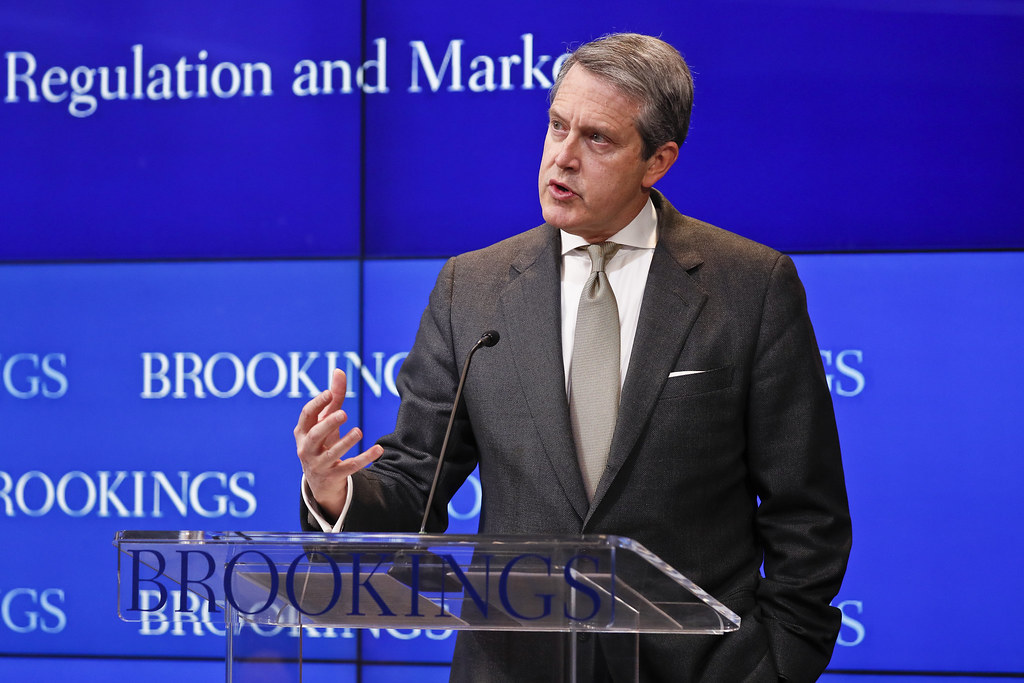The news that Federal Reserve Vice Chair for Supervision Randal Quarles will step down from the Board of Governors next month should prompt a sigh of relief from anyone who cares about reining in Wall Street. Quarles was the public face of the Fed’s many handouts to the biggest banks throughout the Trump years, making his title of “Vice Chair for Supervision” somewhat Orwellian in his deliberate ignorance.
What this news should not do is alleviate any fears that President Biden will allow those handouts to stay in place. Indeed, there is no assurance whatsoever that Quarles’ successor will have anything close to Quarles’ own power, should Biden refuse to nominate a new Federal Reserve Chair.
Anyone who’s followed the intra-Democratic imbroglio over the Fed Chair knows that critics, including ourselves, have castigated current Chair Jerome Powell for the deregulations under his watch. Powell’s defenders often claim this is an unfair criticism, and that Quarles should own the Fed’s deregulatory record as Vice Chair for Supervision. (This is in the cases where these oh-so-savvy pundits actually get Quarles’ job title right.)
This argument reveals these Powell defenders’ own ignorance about how the Federal Reserve actually works. While there are many members of the Federal Reserve Board of Governors, only the Chair is “its active executive officer,” in the words of the Federal Reserve Act. That means that under federal law, only the Chair has actual power over the day-to-day operations of the institution — most importantly, the power to assign tasks to staff.
As Todd Phillips writes in a forthcoming law review article, this is a vastly more important power than many outside observers understand. In order for the Board of Governors to vote on a given policy — say, a deregulation of the biggest banks — the Fed’s staff first has to write the actual text of the proposal, in legal language that can hopefully stand up to a judge’s scrutiny. This is a time-consuming process. It’s not something any Governor can do on their own, including Quarles.
Thus, in order for Quarles to even have a policy for the Board to vote on, he needs to pitch the idea to the Chair. If the Chair thinks a proposal isn’t worth spending agency resources on, it never even gets off the ground. All of this is before the proposal even comes before a vote, which again, is a decision that the Chair makes. The fact that Chairs almost never bring matters to a vote when there are mixed opinions explains much of the Fed’s public image of governing by unanimity.
As Phillips writes, the centralized power structure at the Fed is common across many federal commissions, despite their common perception as being more democratic. Policies opposed by Chairs across the federal government almost never see the light of day, either because the Chair never brings them up for a vote or because the Chair never even allocates the resources to create a proposal in the first place.
All of this is to say that Powell absolutely owns the Fed’s recent deregulatory spree just as much, if not more, than Quarles. It is unsurprising that the two have been aligned on a pro-Wall Street agenda. Though they didn’t overlap, both Quarles and Powell come out of the Carlyle Group, a powerful private equity firm whose entire business model is predicated on exploiting the revolving door and insider contacts in the federal government.
If Biden enacts the compromise which a great many self-satisfied Fed-watchers have proposed, and nominates a new Vice Chair for Supervision while reappointing Powell as Chair, there is absolutely no guarantee that any of that Vice Chair’s regulatory proposals will actually be adopted as policy, or even reach a point where they can come up for a vote.
Powell has tried desperately to disentangle himself from Quarles in recent months — which is quite an about-face for a man who said at his Chairship confirmation “my relationship with Randy Quarles goes back so far, I cannot think of what a first meeting would be like. I actually hired him at Treasury 25 years ago, and he has been a close friend all that time. I think we are very well aligned on our approach to the issues that he will face as Vice Chair for Supervision.” [emphasis added]
If the Chair doesn’t agree with the Vice Chair’s approach, the Vice Chair’s title becomes essentially ceremonial. For Quarles’ departure to actually affect real-world policy — on everything from the climate crisis and crypto bubble to traditional prudential concerns under statutes like Dodd-Frank — Biden has to dump Powell too.
PHOTO CREDIT: “Randal Quarles, vice chairman for supervision of the Federal Reserve Board, delivers his keynote presentation” by BrookingsInst is licensed under CC BY-NC-ND 2.0

